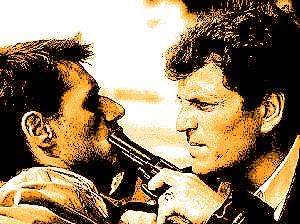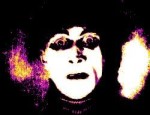Film Review

Bleu comme l'enfer is Boisset's most American thriller, an all-too-obvious attempt to try to freshen up a genre that was rapidly going out of fashion in the mid-1980s. Out goes the sophistication of the French policier, and in comes a deluge of sadism, violence, sex and pointless chasing around in cars. The film looks pretty anaemic today, one of the director's weaker films, although it is at least partly redeemed by the quality of the acting.
Even though their characters are blatant stereotypes, the film's three lead actors - Lambert Wilson, Tchéky Karyo and Myriem Roussel - put in some commendable performances which help to sustain our interest in the pretty formulaic narrative. Karyo is terrific as the film's psychopathic villain whilst Wilson makes a sympathetic and enigmatic hero. In classic French film noir fashion, the moral positions between Wilson and Karyo's characters are soon reversed, but with an ingenious twist at the end.
© James Travers 2004
The above content is owned by frenchfilms.org and must not be copied.
Film Synopsis
Ned is a smalltime crook whose attempt to rob a motorway snack bar is frustrated by Franck, a ruthless cop. Never one to play by the rules if he can help it, Franck takes Ned back to his home at gunpoint, with the intention of inflicting on him some suitable form of chastisement. On his arrival, the sadistic cop is confronted with the news that his wife Lily intends to leave him. Having failed to reason with his wife, Franck resorts to physical violence. Lily's sister Carole comes to her rescue and the two women flee with Ned, having rendered the now berserk Franck unconscious. Parting with Carole, Lily and Ned resume their desperate flight towards the border, knowing they will be safe once they get across it. When Franck comes to he is not in a forgiving mood. Without a moment's thought, he goes after the fugitives, salivating at the prospect of the justice he will deliver when he catches up with them. There is nothing more dangerous than a cop with a grudge...© James Travers
The above content is owned by frenchfilms.org and must not be copied.
Similar Films
Here are some other films you may enjoy watching:- Dobermann (1997)
- Le Gorille vous salue bien (1958)
- Diamant 13 (2009)
- Magnum Force (1973)
- Antigang (2015)
Other related links:
Film Credits
- Director: Yves Boisset
- Script: Yves Boisset, Jean Herman, Sandra Majerowicz, Philippe Djian (novel)
- Cinematographer: Dominique Brenguier
- Music: Pierre Porte
- Cast: Lambert Wilson (Ned), Tchéky Karyo (Franck), Myriem Roussel (Lily), Agnès Soral (Carol), Benoît Régent (Henri), Constance Schacher (Marjorie), Sandra Montaigu (Sarah), Julien Bukowski (Willy), Gérard Zalcberg (Zac), Alex Descas (Le noir), Philippe Dormoy (Le rouquin), André Julien (Popeye), Bernard Bloch (Kovacs), Jean-Pierre Bagot (Fonctionnaire douane), Georges Lycan (Barman), Nathalie Bemeniuk, Lucien Canezza, Jacques Couderc, Pierre Decazes, Guy Dhers
- Country: France
- Language: French
- Support: Color
- Runtime: 103 min
- Aka: Blue Hell
The best French Films of the 1910s

The very best of German cinema

The very best of the French New Wave
